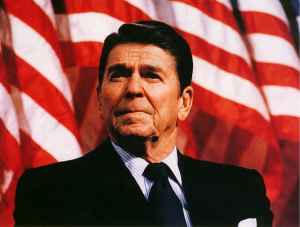- MENU
- HOME
- SEARCH
- WORLD
- MAIN
- AFRICA
- ASIA
- BALKANS
- EUROPE
- LATIN AMERICA
- MIDDLE EAST
- United Kingdom
- United States
- Argentina
- Australia
- Austria
- Benelux
- Brazil
- Canada
- China
- France
- Germany
- Greece
- Hungary
- India
- Indonesia
- Ireland
- Israel
- Italy
- Japan
- Korea
- Mexico
- New Zealand
- Pakistan
- Philippines
- Poland
- Russia
- South Africa
- Spain
- Taiwan
- Turkey
- USA
- BUSINESS
- WEALTH
- STOCKS
- TECH
- HEALTH
- LIFESTYLE
- ENTERTAINMENT
- SPORTS
- RSS
- iHaveNet.com: Politics
by Clarence Page

Ronald Reagan
President Ronald Reagan didn't care much about his legacy, he used to joke, since he wouldn't be around to read it. If he were, he'd have lot to read -- and chuckle about.
As Reagan's 100th birthday anniversary on Sunday, Feb. 6, approaches, a small blizzard of articles and commentaries marvel at his similarities to President Barack Obama. I am fascinated just as much by their differences.
It's hard to say, for example, how much Reagan might have learned from Obama, but Obama appears to have learned a lot from Reagan.
Compared to Obama, who still struggles against the rap that he's "too professorial," Reagan was called many things but seldom an intellectual. Yet, as historian Richard Norton Smith quotes Robert McFarlane, a Reagan national security adviser, marveling at his former boss, "He knows so little and accomplishes so much."
Driven by his firmly held conservative ideals, Reagan combined his acting skills, people skills and political savvy into what one biographer called "the role of a lifetime." For example, he could sell many Americans on the virtues of smaller government even as he signed bills that made it bigger.
He never submitted a balanced budget during his eight years in the
The Reagan transformation helps explain why some of the proposals in Obama's recent State of the Union address sounded so Reaganesque: a freeze in discretionary spending and federal salaries, a wish to simplify the tax code, cuts to the
As a
"There is no mistaking Obama's increasing reliance on his predecessor's career as a helpful template for his own," Time's Michael Scherer and Michael Duffy write. "Both men entered office in wave elections in which the political center made a historic shift. Both faced deep economic downturns with spiking unemployment in their first term. Both relied heavily on the power of oratory."
Yet media in the 1990s could have made the same comparisons between Reagan and President Bill Clinton.
Under pressure to govern despite midterm election setbacks and hostile congressional leaders, Reagan, Clinton and Obama gave a vigorous voice to their political base while signing compromises with their political opponents. Yet Clinton and Obama operated within the Reagan template in ways that showed Reagan's legacy: Sell sunny optimism and while casting your opponents as the gloomy doomsayers.
If Reagan in his way wrote that story line, Clinton and Obama found themselves blessed with opponents who cooperated by fitting well into the obstructionist role, even when scoring hard-won conservative victories like welfare reform.
That makes Reagan, love him or not, a "transformational leader" in the sense that theorists describe as taking a visionary position and inspiring people to follow. By contrast, a "transactional" leader may speak of "hope" and "change" but mostly works within existing assumptions of reward and punishment to get things done.
Reagan in transformational style declared a clear and simple ideology and stuck with it, regardless of what short-term compromises he had to make to move legislation. As a result his memory is iconic on the right, reverently cited in Republican primary debates. Meanwhile, the biggest complaint you hear from Obama's side is how uneasily the current president fits into any ideological box narrower than "center-left."
That's not a bad thing, in my view. In the long run, Obama still has a chance to be seen by history as transformational. If his health care overhaul, for example, survives legal and legislative challenges and wins the hearts of the public in the way
"What I would really like to do," Reagan once said, "is to go down in history as the president who made Americans believe in themselves again." Obama's election in itself helped to do that. Doing it with his presidency will be tougher.
Read the latest political news.
Available at Amazon.com:
God of Liberty: A Religious History of the American Revolution
Jimmy Carter: The American Presidents Series: The 39th President, 1977-81
The Disappearing Center: Engaged Citizens, Polarization, and American Democracy
The Virtues of Mendacity: On Lying in Politics
Bush on the Home Front: Domestic Policy Triumphs and Setbacks
The Political Fix: Changing the Game of American Democracy, from the Grassroots to the White House
Revival: The Struggle for Survival Inside the Obama White House
Renegade: The Making of a President
Year of Meteors: Stephen Douglas, Abraham Lincoln, and the Election that Brought on the Civil War
AMERICAN POLITICS
WORLD | AFRICA | ASIA | EUROPE | LATIN AMERICA | MIDDLE EAST | UNITED STATES | ECONOMICS | EDUCATION | ENVIRONMENT | FOREIGN POLICY | POLITICS
Receive our political analysis by email by subscribing here
Reagan and Obama: Differently Similar | Politics
© Tribune Media Services